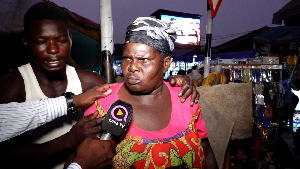Accra, June 27, GNA - A book entitled "Call to Duty: The Enforced Restoration of the Constitution of Ghana" authored by Osahene Boakye Djan, a former member of the Armed Forces Revolutionary Council (AFRC), was on Wednesday launched in Accra.
The 217-page book with nine chapters is an attempt by the author to provide an orderly account of the June 4 Uprising and some key aspects of the AFRC rule that had appeared in public between 1980 and 2006. The book also looks at the conduct of the AFRC regime and out of office developments some of which have been challenged one way or the other since 1979.
Osahene Boakye Djan, a key architect of the June 4 Uprising, who spoke on the topic: "The Unfinished Business for African Unity: Moving Africans into the Mainstream of Global Humanity," stated that the book established a clear linkage between the "Free Africa Movement" which began in 1970 by few military officers to pursue an approach to African unity and the unfinished business of African unity.
He said the group got down to work and within six months had produced a work plan or the dream with a deadline referred to as the "Africa Home Project".
Osahene Boakye Djan said the plan identified the "African Home" as the ultimate objective for African unity that would allow Africans wherever they may be to move on as quickly as possible from the fringes into the mainstream of global humanity.
He said the group at that time concluded that the unacceptable condition of Africa was a sore that needed to be healed before it became a scar on the conscience of humanity.
"Thirty-seven years on, the sore is still festering. There is no evidence that it has even started to heal, and therefore there can be no justifiable talk about any scar that could only have been left behind after the healing process," he added.
Osahene Boakye Djan also said the plan to have an "African Home" was the driving force that led to the June 4, 1979 uprising and the AFRC regime whose immediate and short objective was to restore the constitution of Ghana in 1979.
He said the African condition then, as it is today, was found to be unacceptable and something had to be done about it.
He said the movement registered its disapproval both at the existing African condition and its treatment as a key element of the plan thereby ordering a study into the roots of the crisis from the historical perspective.
Osahene Boakye Djan further noted that there were both domestic and African dimensions to the June 4, 1979 Uprising and the AFRC administration.
He said the AFRC on the domestic front was to restore the constitution of Ghana and hold to account those who overthrew governments and constitutions since 1966 and those who profited corruptly from those regimes.
Dr Kwasi Jonah, Senior Lecturer, Political Science Department, University of Ghana, who reviewed the book, said for a country like Ghana which had frequent coups d'etats in its political history, the June 4, 1979 Uprising stood out in its profound uniqueness. He said June 4 threw out a military and not democratically elected civil regime and lasted not more than four months, the shortest-lived military regime, and was about the first coup in Ghana in which junior ranks of the armed forces played a significant role both in its execution and post-coup administration.
He said the book was a collection of responses to matters affecting the June 4 Uprising and the AFRC during and after its short reign. He said majority of the information provided by the book was already public knowledge having appeared in newspapers and the National Reconciliation Commission report.
"There is neither the intention nor the pretension to produce an original academic analysis of June Fourth and the AFRC nor provide completely new and unknown information about them," he added. Dr Jonah stated that the book also made a clear conceptual distinction between constitutional coup d'etats from anti-constitutional coup d'etats.
He said whereas the former targeted unconstitutional military governments before it and did not suspend any constitution the unconstitutional coups overthrew an elected constitutional government, suspended the constitution and parliament and banned political parties. Dr Jonah said in spite of its enormous value the book had few irritating errors such as wrong spelling and wrong page numbering. He said most disturbing document in the book is the half hearted apology of the AFRC at the National Reconciliation Commission which, he said, the group should have offered wholehearted to the victims of the regime.
General News of Wednesday, 27 June 2007
Source: GNA












